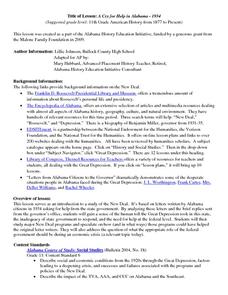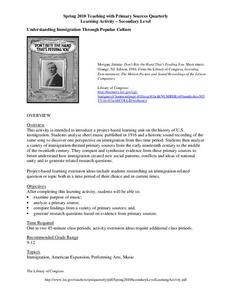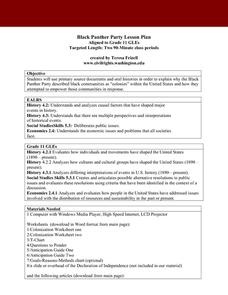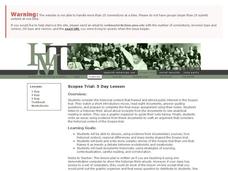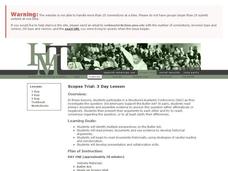Alabama Department of Archives and History
A Cry for Help in Alabama - 1934
What should be the role of the federal government during an economic crisis? That is the question at the center of this introduction to a study of the New Deal. Class members examine letters to the state government asking for help,...
Youth Leadership Initiative
Selecting a President: Primaries and Caucuses
What is a party caucus anyway? And what part do caucuses play in the primaries? Everything future voters need to know about the four stages in the presidential selection process is provided by this resource. The 2012 US Presidential...
Library of Congress
Understanding Immigration Through Popular Culture
Class members are introduced to a project-based learning unit on US immigration with an activity that asks them to analyze sheet music and other primary source materials to uncover issues raised by immigration.
Alabama Department of Archives and History
Yellow Journalism
What role did yellow journalism play in bringing the United States into war with Spain? As part of their study of the Spanish-American War, class groups examine newspapers of the times and other texts and then produce their own...
City University of New York
Presidential Elections and the Electoral College
To understand the controversy surrounding the US 2000 presidential election, class members investigate the rationale behind the Electoral Collage, the intimidation involved in the election of 1876, and the 2004 American League...
Stanford University
Close Reading
Here's a poster that highlights the skills needed for the close reading of primary source documents when gathering evidence to support historical claims.
University of Wisconsin
Why Did the Triangle Fire Occur?
An investigation of the 1911 New York City Triangle Shirtwaist Factory fire leads class members to examine primary and secondary source materials related to the event and apply what they learn about the working conditions at the time to...
Stanford University
Historical Thinking Chart
Narrow down your questions about author perspective, historical context, and veracity of claims in a document with the help of a historical reading chart. Learners track the basics of the document along with advanced evaluation skills...
National Endowment for the Humanities
The Victor's Virtue: A Cultural History of Sport
Pupils explore the meaning of the ancient Greek word aretê and the place of virtue in historical athletic competition and modern sports. They begin by reading an informational text on the goal of sports in education, and then evaluate...
The New York Times
Great Debate: Developing Argumentation Skills
"Advertising has no impact on whether people buy something." "Looting is morally permissible during national disasters and emergencies." "Gay teenagers should be allowed to take dates to the prom." Considering a class debate? Check out...
Roy Rosenzweig Center for History and New Media
End of the Cold War
How significant was the Cold War during the 20th century? After reading and analyzing speeches by Ronald Reagan and Mikhail Gorbachev, learners consider the historical context of foreign policy decisions made during the Cold War by both...
National Constitution Center
Fourth of July (Grades 9-12)
Class members work to translate the Declaration of Independence into their own words, as well as design a Facebook page within the context of 1776 to raise public awareness about the document and its meaning for citizens.
Curated OER
Black Panther Party Lesson Plan
Why did the Black Panther Party feel colonized, and what methods did they employ to achieve empowerment? Your class members will engage in an online PowerPoint presentation, analysis of several documents, and discussion in order to...
Historical Thinking Matters
Rosa Parks: 5 Day Lesson
What led to the success of the Montgomery Bus Boycott, and how might historians approach this question differently? This rich series of lessons includes a short introductory video clip, analysis of six primary source documents, and...
Historical Thinking Matters
Rosa Parks: 3 Day Lesson
How can evidence and perspective challenge even the most well-known of stories? Through primary and secondary source analysis, think-alouds, and discussion, young historians evaluate the historical narrative of Rosa Parks across multiple...
Historical Thinking Matters
Rosa Parks: 1 Day Lesson
You've heard of the historical moment when Rosa Parks refused to give up her seat on a bus, but did you know that some historical accounts disagree on where she sat? Investigate this query with your young historians, and practice...
Historical Thinking Matters
Scopes Trial: 5 Day Lesson
Did Scopes violate the Butler Act? Why did so many Americans follow the Scopes trial? See analytical reading in action with a fantastic five-day lesson plan in which class members consider the historical context that provoked public...
Historical Thinking Matters
Scopes Trial: 3 Day Lesson
Was the Scopes trial more complicated than a simple debate between evolutionists and creationists? As part of a structured academic controversy (SAC) activity, pupils consider multiple perspectives of the Butler Act and engage in close...
Historical Thinking Matters
Scopes Trial: 1 Day Lesson
Why did many Tennesseeans support the 1925 Butler Act, which forbade the teaching of evolution? Using several primary source documents and a brief video clip, your young historians will draw connections between the broader historical...
Historical Thinking Matters
Social Security: 1 Day Lesson
Should the United States provide relief for those who are unemployed? Trace this question back to the Great Depression with your young historians, who will engage in careful reading of historical documents and classroom discussion to...
Middle Level Learning
Philip Reid and the Statue of Freedom
Approach the concept of freedom in United States history from a variety of angles and delve into rich primary source analysis practice. Pupils study the Statue of Freedom, which sits atop the dome of the Capitol building in Washington...
Education World
St. Patricks Day Lesson: The Real Story of St. Patrick
Fun St. Patrick's Day facts abound. The lesson plan tells the story of the most famous icons associated with the holiday: the shamrock, snakes, Celtic religion, Irish history, and St. Patrick himself.
Federal Reserve Bank
Worth!
Before loaning a friend money, what factors would you consider and why would you lend it? Your young economists will face questions like these in a lesson on banking, profit, risk, and reward, which includes the reading of the book...
Smithsonian Institution
We Have a Story to Tell: Native Peoples of the Chesapeake Region
How did colonial settlement and the establishment of the United States affect Native Americans in the Chesapeake region? Your young historians will analyze contemporary and historical maps, read informational texts, and work in groups to...


